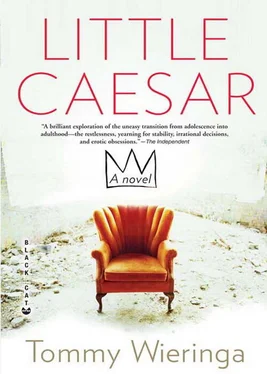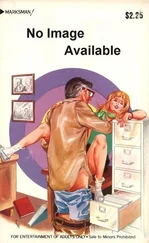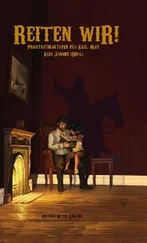No history, only current events.
That was how I imagined her wordless fear.
We went back to the hospital only when she thought she felt something in her breast.
‘Maybe it’s just an infection,’ she hushed.
Let it be a tumor, was the thought that shot through my mind, let the bastards be proven wrong.
But the results produced no triumph.
‘We clearly see a tumor now,’ the surgeon said.
There are no other sounds. Only that voice, that little sentence. The same woman as last time.
‘We can’t be completely sure whether it’s formed secondaries yet.
And I don’t think it looks good, as you put it. The infiltrative mamma carcinoma, the tumor, which started in the milk ducts, has spread to the inside. And the underlying tumor has, as it were, drawn the nipple back. Made it disappear. Had you noticed that?’
‘I had noticed that, yes,’ my mother said.
‘There are ulcerations on the breast. We’ll have to deal with those right away, if you don’t do anything the holes in the skin will become larger and larger.’
‘Oh, but I’m not at all sure that I want that.’
Everything about Dr. Rooyaards fell silent. Except for her eyes, where an expression seemed to deepen.
‘I’d really have to think about that first,’ my mother went on. ‘I don’t want, now that I’ve come this far. . no.’
She had already regrouped; the surprise, the shock, encapsulated in an instant — she had once again taken control.
‘I have the impression,’ Rooyaards said, ‘but correct me if I’m wrong, that you think I’m saying these things because I’m somehow against you. But that is not the case, Mrs. Unger, believe me. I see a malignancy in your breast, a red, tumorous tissue. It needn’t be too late. You have to seize this chance. If you don’t, then you will truly have given up a real opportunity to recover. That would be such a pity, Mrs. Unger, such a pity. You owe it to yourself. You do want to get better, don’t you?’
For a moment I was in love with her. She was beautiful in her plea — gestures of restrained, impotent anger, a powerful force being held in check and reduced in language to the proportions of reasonability. A tour de force, a lovely thing to see. For just a moment there I thought it might work, that Marthe Unger would allow herself to be lured to this side of the fence. Then the ax fell.
‘No,’ she said. ‘I have to remain faithful to myself. I have to. .’
That was all there was. The judgment remained suspended in that vacuum, the decision about how she was going to die.
And I wanted her dead, oh yes. It had all taken long enough. Applause, curtains and zip back home. I would sing as I cremated her body. Her just deserts. Her faithlessness, the egoism. The whims, the irresponsibility and the recklessness; the fears which, in addition to life itself, she had awakened in me with a kiss. For all these things there was only one appropriate sanction.
You have no idea what it’s like, that’s why you’re able to think such things. You don’t know a thing about it.
I smelled it whenever I came in, the smell of rotting. Her body had already begun decomposing, while inside there, inside that skin, there was still someone living who insisted that spontaneous remissions occur quite frequently . She stuffed perfume-drenched handkerchiefs into her bra to stanch the flow from her nipple, but the smell came right through it, right through her clothing and the shroud of Chanel No. 5. Incense drifted through the room like a mist. Did she know that her end had come? That the net was drawing closed? I begged her not to wait any longer for an operation.
‘But then I would only be doing it for you, Ludwig. Is that what you want, for me to be unfaithful to myself because you wanted me to let them cut into me?’
Once the day and the hour had been established, would the anger stop then? Perhaps one lays down one’s weapons as soon as there is nothing more to be lost or won. When the days of your life are still unnumbered, you lived in a carefree eternity, it could end tomorrow or never, who’s to say? Within that free space you have every opportunity to fight your wars, to defend your interests, to run amok with impunity.
Until it slams to a halt.
We were not the ones present anymore, the only things in the room were my despair and her denial. More often than that, I felt nothing at all. Then I would sit there looking at her with the cold eyes of a fish, not knowing whether her death would bring me joy or sorrow.
The windows were wide open all the time now. The canary still did not sing. The stench was unbearable. The thought of turning my back on her did occur to me, it occurred to me often, but I knew I lacked the strength for such radicalness. Why remain loyal for a lifetime and then jump ship just before the end?
‘Maybe you should put some more eau de cologne on it,’ I say. ‘You stink.’
‘Don’t exaggerate, for once.’
‘It smells here of the Third World. The alley behind a restaurant.’
‘If you’re going to start in again, then just go away.’
All you see is the current manifestation, you and her, today. Far away, invisible now, are the things that happened; she, your young mother, smoking cigarettes absently at Trianon, you with your nose up against the pastry display case, or how she brushes your hair, for a very long time and very slowly, as you lie rolled up like a cat on her lap — but those things no longer play a role in the cruel, acute now in which you pound away at each other’s souls.
When finally, because there was really no way around it, she allowed them to operate on her breast — that breast seen by so many eyes, desired by countless, now riddled with cancer and reeking horribly — she did so under protest, as though she were being forced into it. She could not admit the defeat, the failure. She felt betrayed. The miracle had not happened. Her belief and dogged faith had not been rewarded. The cosmos, the powers, no hand had reached out to her. She felt wronged and angry, in a voice thick with emotion she said, ‘It’s really hard to keep believing now. Really hard.’
Her tears were called loneliness, loneliness, loneliness. She entered the night in a white hospital smock with buttons down the back.
The cone excision, whereby both the nipple and the underlying, damaged glandular tissue were removed, called for post-treatment with radiation, but she refused point blank.
‘Your mother might get lucky,’ Dr. Rooyaards told me. ‘There’s no guaranteeing it, but she might.’
She had counted on a miracle and now all she could do was hope for good luck. Two days later she was allowed to go home, out through the revolving doors, to find her life again, see if it still fit. In the car I asked how she was feeling.
‘Oh, good, yeah.’
At home she lay down on her bed, asked me to bring her her glasses and a scarf. When I came back, she was sound asleep. The smell of cadaver had disappeared. I whistled quietly to the canary, unilaterally, and cleaned its cage. Then I gave it clean water and fresh seed. At the little village Attent supermarket, I did some shopping. Because of my hotel-hopping I had never learned to cook well, but I did know how to whip together pasta with anchovies and tomato.
‘Sorry, sweetheart, but I’m not very hungry,’ she said after pecking at her food a few times.
She went back to sleep. It was pleasant to care for her, her enfeeblement fostered a certain harmony. From the doorway I looked at her and thought about her life, about how she had cashed in on desire, twice over in fact, but that now, in the act of dying, had fallen from the pinnacle of the big top all the way to the ground, all the way to this bed.
Читать дальше












